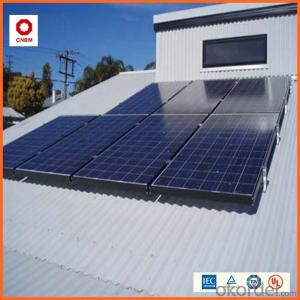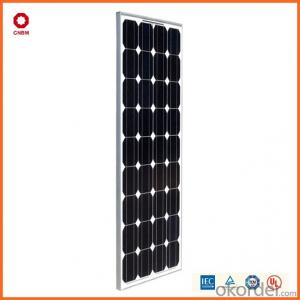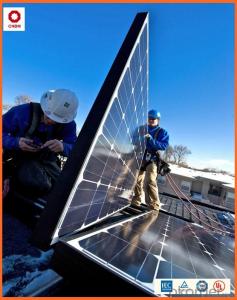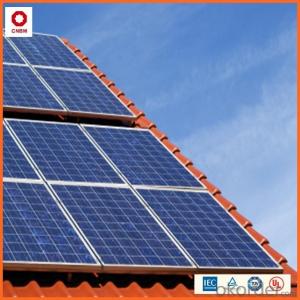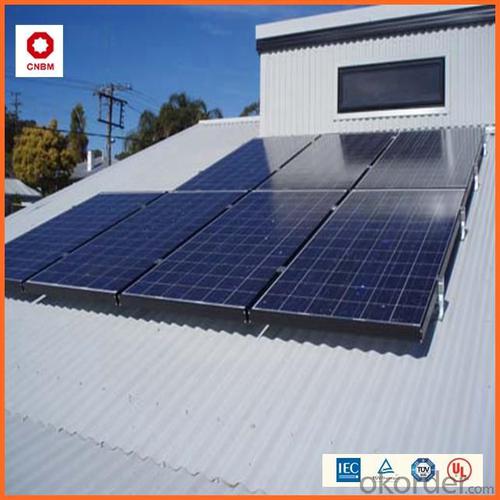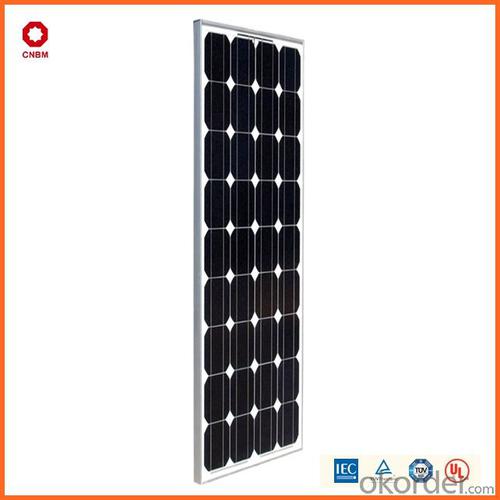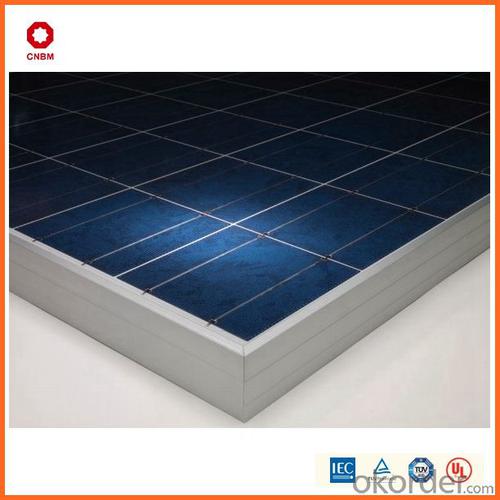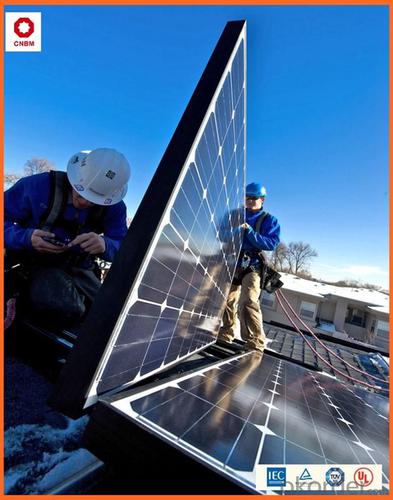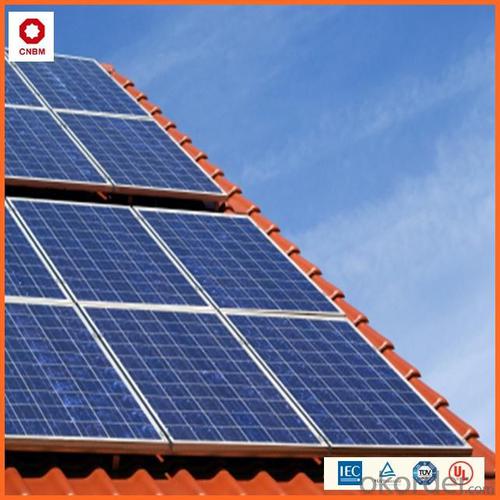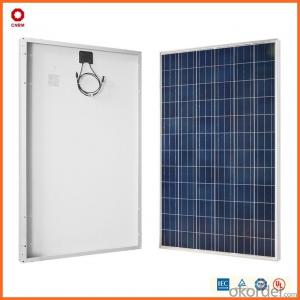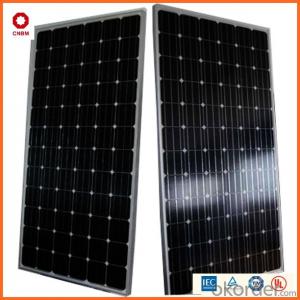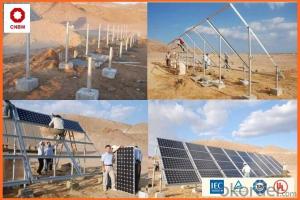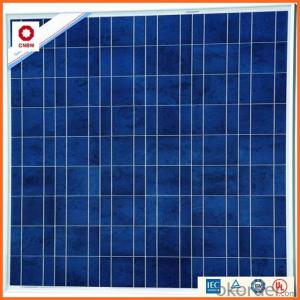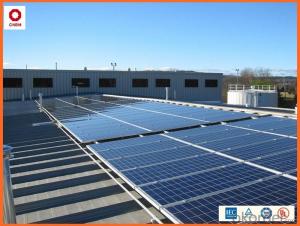125w Small Solar Panels in Stock - Solar Energy Systems Melbourne - China Manufacturer
- Loading Port:
- China main port
- Payment Terms:
- TT OR LC
- Min Order Qty:
- 1 watt
- Supply Capability:
- 10000000 watt/month
OKorder Service Pledge
OKorder Financial Service
You Might Also Like
Specification
Product Description:
Hot Sale !!! Quality and Safety of Small Poly Solar Panel 5w~150w
1. Rigorous quality control meets the highest international standards.
2. High-transmissivity low-iron tempered glass, strong aluminium frame.
3. Using UV-resistant silicon.
4. IS09001/14001/CE/TUV/UL
Warranties of Small Poly Solar Panel 35~85w
1. 10 years limited product warranty
2. 15 years at 90% of the minimal rated power output
3. 25 years at 80% of the minimal rated power output
Specification
Characteristics of Poly solar panels CNBM (245-320W) | |||||
Max Power Voltage Vmp(V) | 30.3 | 30.8 | 31.1 | 31.4 | 31.85 |
Max Power Current Imp(A) | 7.60 | 7.64 | 7.73 | 7.81 | 7.85 |
Open Circuit Voltage Voc(V) | 36.1 | 36.6 | 37 | 37.3 | 37.68 |
Short Circuit Current Isc(A) | 8.50 | 8.55 | 8.65 | 8.75 | 8.85 |
Max Power Pm(W) | 230W | 235W | 240W | 245W | 250W |
Temperature Coefficient of Cells Poly solar panels CNBM (245-320W) | |
NOCT | 45± 2 |
Temperature Coeffucients of Isc | 0.0492 |
Temperature Coeffucients of Voc | -0.3374 |
Temperature Coeffucients of Voc | -0.4677 |
Mechanical Data of Poly solar panels CNBM (245-320W) | |
Dimension | 1638 × 982 × 40 mm |
Weight | 19.5 kg |
No. of Cells and Connections | 60 (6 ×10) |
Tolerance | 0 ~ + 5 W |
Cell | Monocrystalline Cell 156 × 156 mm |
Packing | 624 Pcs/40ft(H) Container |
Limits of Poly solar panels CNBM (245-320W) | |
Operating Temperature | -40 to +85 |
Storage Temperature | -40 to +85 |
Max System Voltage | 1000VDC(IEC) / 600VDC(UL) |
Features of our products:
• High conversion efficiency mono/poly-crystalline amorphous silicon solar cells
• Modules incorporate high performance bypass diodes to minimize the power drop caused by shading
• High transmittance, low-iron tempered glass
• High performance EVA encapsulant to prevent destroying and water.
• AI frame: without screw, corner connection. 8 holes on the frame can be installed easily
• Good performance of preventing from atrocious weather such as wind and hails
• Certifications: CE IEC TUV VDE UL, Class I
• 10 years 90% power output warranty

Shipping of Small Poly Solar Panel 35~85w
By Sea | Delivery from Shanghai or Ningbo seaport |
By Air | Departure from Shanghai Pudong Airport |
By Express | Post by DHL, EMS, UPS, TNT. |
Features of our products:
• High conversion efficiency mono/poly-crystalline amorphous silicon solar cells
• Modules incorporate high performance bypass diodes to minimize the power drop caused by shading
• High transmittance, low-iron tempered glass
• High performance EVA encapsulant to prevent destroying and water.
• AI frame: without screw, corner connection. 8 holes on the frame can be installed easily
• Good performance of preventing from atrocious weather such as wind and hails
• Certifications: CE IEC TUV VDE UL, Class I
• 10 years 90% power output warranty
As a professional Solar Panel manufacturer and Supplier in China, we have our customers come around the whole world and our specialization has got a worldwide recognition. Meanwhile, with our superior quality, competitive price, prompt and excellent service, As main role in trade section of CNBM Group, CNBM International Corporation supplies products including Monocrystalline Solar Panel, Polycrystalline Solar Panel ( multicrystalline silicon Solar Panel) have received and enjoyed famous reputation in many countries and regions in the world.
- Q: Can a solar energy system be used in areas prone to hurricanes or tornadoes?
- Yes, solar energy systems can be used in areas prone to hurricanes or tornadoes. However, it is important to ensure proper installation and design to withstand severe weather conditions. This includes using hurricane-rated solar panels, reinforced mounting systems, and secure anchoring. Additionally, regular maintenance and inspections are crucial to identify any damages or issues caused by the extreme weather and ensure the system remains operational.
- Q: Can solar energy systems be used in powering agricultural processing facilities?
- Yes, solar energy systems can be used to power agricultural processing facilities. Solar panels can be installed on the rooftops or surrounding land of these facilities to generate electricity. This renewable energy source can provide a reliable and cost-effective solution to meet the power requirements of various agricultural processing operations, such as drying, milling, refrigeration, and packaging. Additionally, solar energy systems can help reduce greenhouse gas emissions and dependence on fossil fuels, making them an environmentally sustainable choice for powering agricultural processing facilities.
- Q: Can solar energy systems be used in areas with limited access to solar panel manufacturers?
- Yes, solar energy systems can still be used in areas with limited access to solar panel manufacturers. In such cases, it may be necessary to import solar panels from manufacturers located elsewhere or explore alternative options such as portable solar panels or solar kits. Additionally, local manufacturing capabilities can be developed gradually to meet the demand for solar panels in the area.
- Q: How do solar energy systems impact social equity?
- Solar energy systems can have a positive impact on social equity by providing affordable and clean energy options to underserved communities. By reducing reliance on fossil fuels and the associated costs, solar energy can help alleviate energy poverty and promote equal access to electricity. Additionally, solar installations can create job opportunities, particularly in disadvantaged areas, contributing to economic empowerment and reducing inequality.
- Q: What is the impact of temperature on the efficiency of a solar energy system?
- The impact of temperature on the efficiency of a solar energy system is that higher temperatures can decrease the overall efficiency of the system. This is because solar panels are most efficient at lower temperatures. As the temperature increases, the performance of the solar cells may decrease due to increased resistance and thermal losses. Therefore, it is important to consider temperature variations when designing and operating a solar energy system to maximize its efficiency.
- Q: Can solar energy systems be used for powering emergency backup systems?
- Yes, solar energy systems can be used to power emergency backup systems. Solar panels can generate electricity even during power outages, providing a reliable and sustainable source of energy for critical systems such as emergency lighting, communication devices, medical equipment, and more. By harnessing the power of the sun, solar energy systems offer a viable solution for ensuring continuous power supply during emergencies.
- Q: Can solar energy systems be used for outdoor recreational activities?
- Yes, solar energy systems can be used for outdoor recreational activities. Solar panels can be used to power various outdoor recreational equipment such as camping lights, portable speakers, and even charging stations for electronic devices. Additionally, solar energy systems can be utilized to power outdoor recreational facilities like swimming pools, sports complexes, and campgrounds, providing sustainable and clean energy for these activities.
- Q: What is the role of trackers in solar energy systems?
- Trackers in solar energy systems play a crucial role in maximizing energy output by optimizing the positioning and orientation of solar panels. These devices actively track the movement of the sun throughout the day, ensuring that the panels are always facing the sun at the optimal angle. By continuously adjusting the position of the panels, trackers enhance energy production and improve the overall efficiency of solar energy systems.
- Q: Can solar energy systems be used in areas with limited access to housing?
- Yes, solar energy systems can be used in areas with limited access to housing. In fact, solar energy can be particularly beneficial in such areas as it offers an independent and decentralized source of power. Solar panels can be installed on rooftops, open spaces, or even mounted on portable structures, making it feasible to generate electricity in remote or off-grid locations. Additionally, advancements in solar technology, such as smaller and more efficient panels, have made it easier to implement solar energy systems in areas with limited housing infrastructure.
- Q: Can solar energy systems be used to power electric vehicles?
- Yes, solar energy systems can be used to power electric vehicles. Solar panels can be installed on the vehicle or on a charging station to harness sunlight and convert it into electricity, which can then be used to charge the vehicle's battery. This enables the vehicle to be charged using renewable energy, reducing reliance on fossil fuels and lowering carbon emissions.
Send your message to us
125w Small Solar Panels in Stock - Solar Energy Systems Melbourne - China Manufacturer
- Loading Port:
- China main port
- Payment Terms:
- TT OR LC
- Min Order Qty:
- 1 watt
- Supply Capability:
- 10000000 watt/month
OKorder Service Pledge
OKorder Financial Service
Similar products
Hot products
Hot Searches
Related keywords
